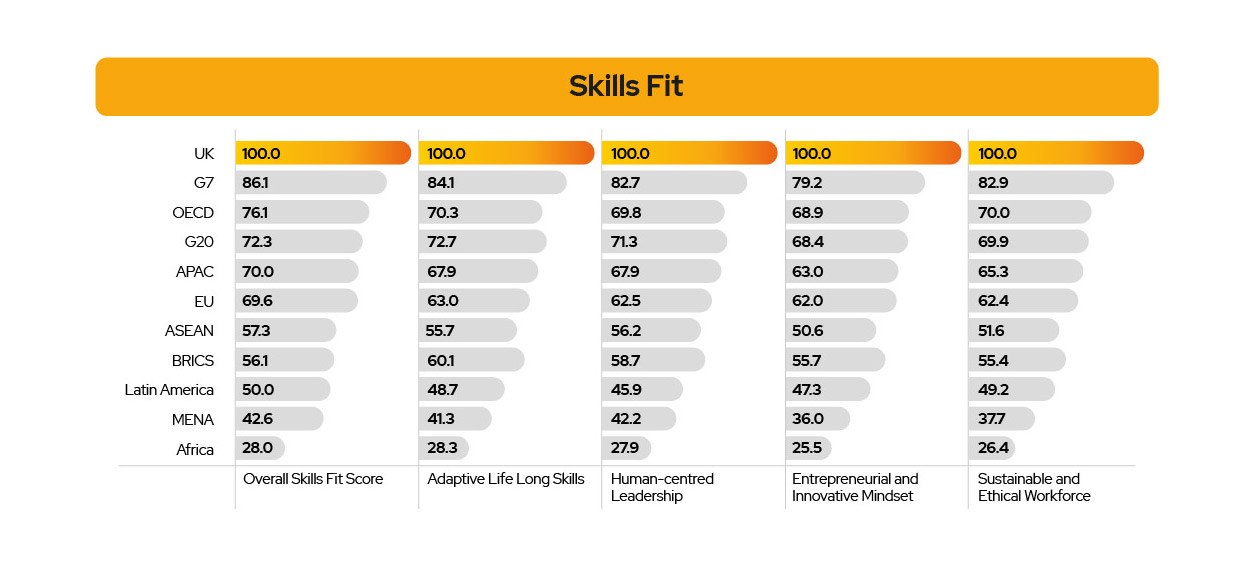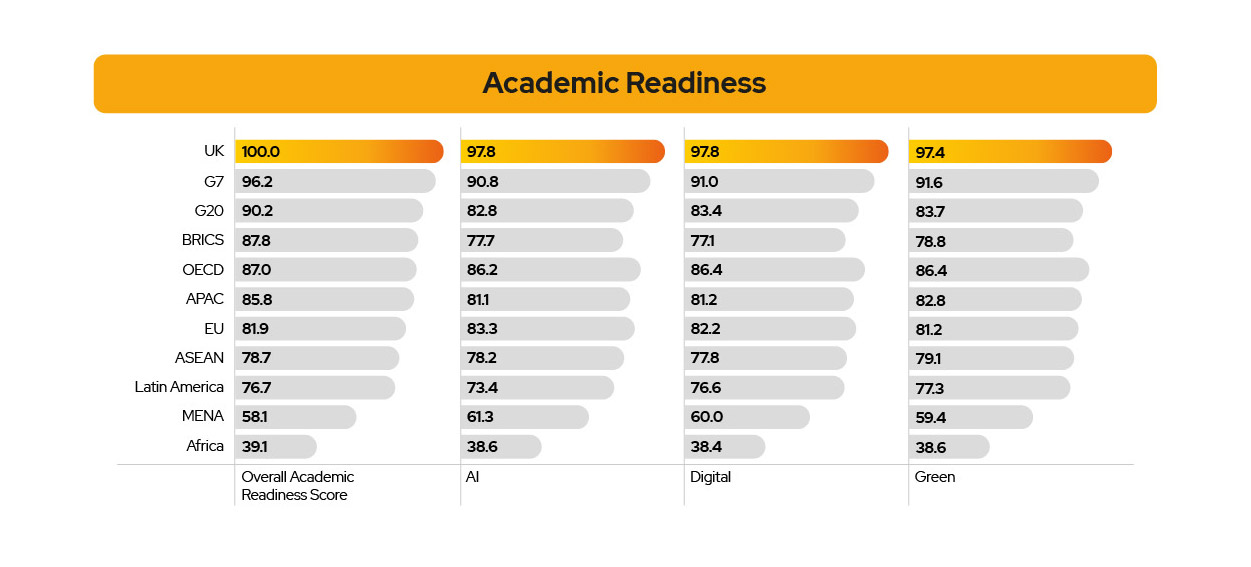Summary:
- The new Post-16 Education and Skills whitepaper calls on higher education to work closely with employers to nurture graduates to have economically useful skills.
- The QS World Future Skills Index shows that UK higher education is, currently, well-aligned to industry needs, producing graduates that have the requisite skills for the future workforce. The UK has a high density of world-class institutions that offer excellent programmes related to AI, sustainability, and digital skills.
- However, the declining median Employer Reputation rank of UK universities suggests there is growing misalignment between industry and academia, which must be reverted if the government’s ambitions are to be realised.
What does the post-16 Education and Skills whitepaper say about higher education?
Universities are asked to work more closely with employers and Skills England to deliver courses tied to priority sectors (digital, AI, green tech, life sciences, construction).
The Government supports expanding access to higher education, but not solely through three-year degrees. Instead, they encourage flexible, modular learning to gain qualifications.
The Government says that higher education must align with the “needs of the economy.” As QS CEO Jessica Turner outlined, the UK Government “envisions a skills system that drives growth, more balanced and reflective of the evolving world of work and one that adds dynamism and expertise to the UK economy. The whitepaper is the government’s view on how to go from 250,000 skilled vacancies to a pipeline of top-quality training to fill these jobs and create new ones.”
UK performance in the QS World Future Skills Index
Early in 2025, we released the first QS World Future Skills Index. Our analysis of UK higher education found that the UK was well positioned for the workforce of tomorrow. It received a perfect score in our Skills Fit and Academic Readiness indicators.
As noted in our UK Spotlight, this suggests very strong higher education performance, and alignment with industry needs.
Skills Fit
Across the three sub-indicators, which look at the skills that will be necessary to be successful in the future workforce, the UK achieves 100/100. “This exceptional performance highlights the nation’s ability to equip its workforce with the agility, creativity, and leadership qualities needed to thrive in a rapidly changing economy,” we wrote in the UK Spotlight.

Evidently, UK higher education is well positioned to realise the UK government’s ambition to equip graduates with the skills necessary for priority sectors. And the demand for cutting-edge skills is only growing. The government already laid out how universities are the engines for innovation and skills in its Industrial Strategy, released earlier this year. Education minister Bridget Phillipson has directed the Strategic Priorities Grants towards “strategically important subjects” such as nursing, midwifery, allied health, in addition to “very high-cost" STEM subjects.
As the UK government places additional emphasis on Further Education and encourages more young people toward apprenticeships, universities need to continue to identify their specialist areas and how they can best contribute not only to economic growth but to necessary future skills.
UK institutions, through continued partnership with industry and governments, must stay ahead of the curve, utilising their world-class research facilities to create innovative curricula.
Academic Readiness
With over 100 universities ranked in the QS World University Rankings by Subject, the UK has a strong foundation, and, crucially, the capacity to teach lots of students in subjects that align with economic demands.

Our indicators, explained
The Skills Fit indicator measures how well countries are equipping graduates with the skills that employers desire. This is assessed by determining the gap between what employers find important and their level of satisfaction with the skills provided by graduates.
Academic Readiness measures how well a country is prepared to train skills workers for the future of work. We look at the number of universities assessed for the QS World University Rankings by Subject, and how they perform.
To maintain its leadership, evolving curricula as workforce demands shift is key. Additionally, as revealed in the Global Student Flows | UK report, the median Employer Reputation rank of UK universities has declined since 2016, suggesting that employers are increasingly dissatisfied with UK graduates, or other countries are rapidly improving their Employer Reputation at the UK’s expense. Regardless of the reason why, it’s critical UK universities rebuild their reputation among employers if the government’s ambitions are to be realised.
Continued investment required
One area of weakness for the UK is its Economic Transformation score. As detailed in the UK Spotlight, “the UK’s low-to-no growth over the past decade, the stagnating workforce productivity, declining real public and private investment and the young-age workforce population decline predicted from 2030 all contribute to low scores in the Economic Transformation indicator.”
However, the UK government has continually signalled that higher education is central to their growth plans and are continuing to offer the Higher Education Innovation Funding (HEIF) initiative, and re-work the Strategic Priorities Grant to target “priority provision which supports future skills needs”.
Ensuring this investment is maximised by institutions, and used on economically prosperous projects, is necessary for higher education to be seen as engines of economic growth and to stay at the forefront of the skills landscape.
Conclusion: A skills-ready future is possible
The QS World Future Skills Index shows that the UK is a future skills pioneer, with a future-ready foundation of a strong higher education sector aligned to industry needs. To realise the ambitions of the UK government and ensure higher education remains a “vital component of the wider skills system”, rebuilding Employer Reputation – which is a cause for concern – is key if higher education is to continue equipping graduates with the required skills for the future of work.









.jpeg)





.jpg)
.jpg)


.jpg)